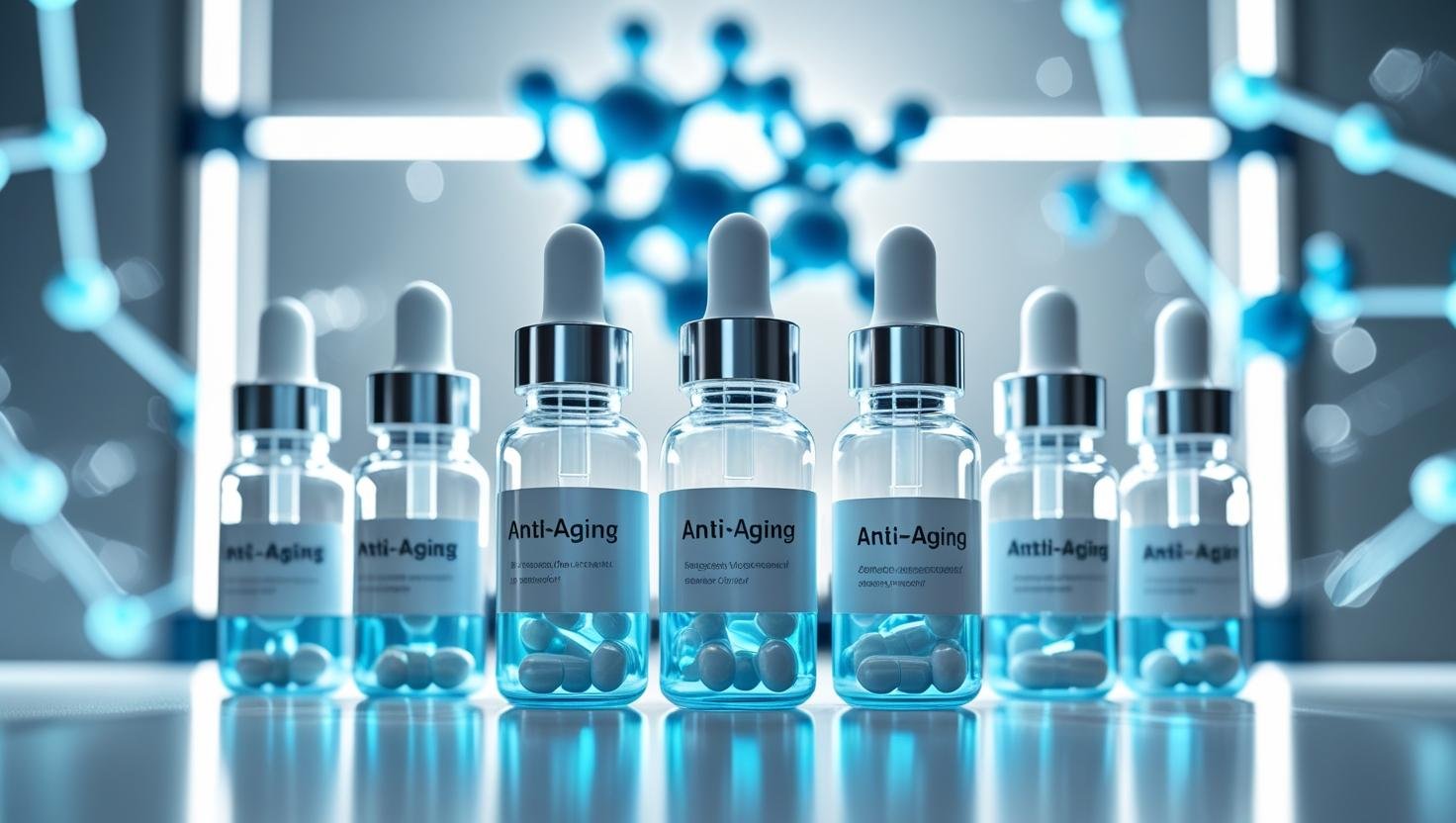Decoding the Science Behind Anti-Aging Supplements: An Investor’s Guide to Smart Longevity Choices
The pursuit of longevity and vitality is no longer confined to elusive fountains of youth. Today, it’s a multi-billion dollar industry fueled by scientific discovery, and at its forefront are anti-aging supplements. For discerning individuals—investors, entrepreneurs, and professionals accustomed to analyzing data and ROI—navigating this market requires more than marketing hype. It demands a rigorous look at the evidence. Understanding the science behind the best anti-aging supplements is crucial for making informed decisions about your health portfolio. This guide cuts through the noise, examining the key players in the longevity supplement space through a lens of biochemistry and clinical research, empowering you to invest wisely in your most valuable asset: your well-being.
The Fundamental Biology of Aging: Why Supplements Can Help
Aging is not a single process but a complex interplay of cellular and molecular decline. Modern science has identified several hallmarks of aging, which are essentially the root causes of our biological decay. Effective anti-aging strategies, including nutraceuticals, target these specific pathways. The goal isn’t to live forever, but to extend “healthspan”—the period of life spent in good health.
Key mechanisms include:
-
Oxidative Stress: An imbalance between free radicals and antioxidants, leading to cellular damage.
-
Inflammation: Chronic, low-grade “inflammaging” that drives age-related diseases.
-
Mitochondrial Dysfunction: The decline of our cellular power plants, reducing energy output.
-
Cellular Senescence: The accumulation of “zombie” cells that refuse to die and inflame their neighbors.
-
NAD+ Depletion: A critical coenzyme for energy production and DNA repair diminishes with age.
Top-Tier Anti-Aging Supplements: A Science-Backed Breakdown
While countless products claim to turn back the clock, only a handful have substantial scientific backing. Here, we analyze the front-runners.
Nicotinamide Mononucleotide (NMN) and Nicotinamide Riboside (NR)
These are perhaps the most buzzed-about molecules in longevity circles, and for good reason. They are direct precursors to Nicotinamide Adenine Dinucleotide (NAD+), a coenzyme vital for life.
-
The Science: NAD+ levels plummet as we age, compromising the function of sirtuins—proteins that regulate cellular health and longevity. This decline is linked to nearly every age-related ailment, from metabolic disease to neurodegeneration.
-
The Evidence: Robust animal studies show that boosting NAD+ with NMN or NR improves insulin sensitivity, enhances mitochondrial function, increases physical endurance, and even extends lifespan. Human trials are ongoing but show promising results in improving vascular health and muscle function.
-
The Bottom Line: NMN and NR represent a direct, targeted approach to countering a fundamental hallmark of aging. They are a cornerstone of any evidence-based anti-aging supplement regimen.
Resveratrol and other Polyphenols
Found in red wine, grapes, and berries, resveratrol catapulted into the public eye for its potential life-extending properties, famously activating sirtuins.
-
The Science: Resveratrol is a potent antioxidant and anti-inflammatory compound. It works synergistically with compounds like NMN, as it activates the same sirtuin pathways that NAD+ fuels.
-
The Evidence: While high-dose resveratrol extended the lifespan of yeast and mice, human results are more nuanced. It consistently shows strong benefits for cardiovascular health, cognitive function, and blood sugar regulation. Its power may be greatest when combined with other supplements.
-
The Bottom Line: Don’t expect a miracle from resveratrol alone. However, as part of a strategic stack, it plays a valuable supporting role in combating oxidative stress and inflammation.
Metformin: From Diabetes Drug to Longevity Candidate
This common diabetes medication is a fascinating case of drug repurposing. It’s one of the most promising anti-aging supplements on the market, though it requires medical supervision.
-
The Science: Metformin primarily works by lowering blood glucose and improving insulin sensitivity. It also appears to activate AMPK, an enzyme that improves metabolic health and may mimic the effects of caloric restriction—a proven method for extending lifespan in many species.
-
The Evidence: Extensive epidemiological data shows that diabetics on metformin have a lower incidence of cancer and cardiovascular disease and often outlive their non-diabetic peers. The landmark TAME (Targeting Aging with Metformin) study is currently underway to formally test its anti-aging effects in non-diabetics.
-
The Bottom Line: Metformin is a powerful contender. However, it is a prescription drug with potential side effects and is not for everyone. Consulting a doctor knowledgeable about longevity medicine is essential.
The Financials of Longevity: Investing in Your Health Capital
For the business-minded individual, the decision to invest in high-quality supplements is a classic cost-benefit analysis.
-
ROI Calculation: The return on investment isn’t measured in dollars, but in quality-adjusted life years (QALYs). How much is increased energy, mental clarity, and reduced disease risk worth to your career and personal life? For high achievers, even a 5% boost in cognitive performance can have monumental professional benefits.
-
Market Volatility vs. Health Stability: The supplement industry is poorly regulated compared to pharmaceuticals. This underscores the importance of choosing brands that invest in third-party testing (look for USP or NSF certifications) and transparently publish their research. Investing in a cheap, untested product is a high-risk venture.
-
The Big Picture: As noted by a Forbes analysis on the longevity economy, preventative health investments now can save monumental sums in future healthcare costs. Viewing these supplements as a form of long-term health insurance is a prudent financial strategy.
How to Build Your Personalized Anti-Aging Protocol
There is no one-size-fits-all solution. Your protocol should be as unique as your financial portfolio.
-
Baseline Assessment: Start with comprehensive blood work. Test your vitamin D, B12, metabolic panel, and inflammatory markers (like CRP). This data-driven approach reveals your specific deficiencies and needs.
-
Start Low and Go Slow: Introduce one new supplement at a time for a few weeks. Monitor your body’s response before adding another. This helps you identify what works and what causes any side effects.
-
Prioritize Foundational Health: No supplement can overcome a poor diet and sedentary lifestyle. Prioritize sleep, a whole-foods diet, regular exercise, and stress management. Supplements are synergistic support, not a replacement.
-
Consult a Professional: Engage a functional or longevity medicine doctor. They can help you interpret your biomarkers and design a safe, effective, and personalized stack of science-backed anti-aging supplements.
Frequently Asked Questions (FAQ)
Q1: Are anti-aging supplements actually proven to work?
A: The answer is nuanced. Specific ingredients like NMN, NR, and Metformin have strong pre-clinical and growing human evidence supporting their ability to target fundamental aging processes and improve health biomarkers. However, “anti-aging” itself is not an FDA-approved claim, and results vary by individual.
Q2: What is the single most effective anti-aging supplement?
A: There is no single “magic pill.” Aging is multi-faceted, so the most effective approach is a combination strategy, or “stack,” that targets different pathways like NAD+ depletion (with NMN/NR), oxidative stress (with Resveratrol), and metabolic health.
Q3: How long does it take to see results from these supplements?
A: This is not like taking a painkiller. These are foundational nutrients that support cellular repair and metabolism. Most people report subtle changes in energy and focus within 4-8 weeks, but significant biomarker improvements (like better cholesterol or blood sugar) may take 3-6 months of consistent use.
Q4: Aren’t these supplements extremely expensive? Is the cost justified?
A: High-purity, clinically-studied ingredients command a premium price. The cost must be weighed against the potential long-term benefits of enhanced health, productivity, and reduced medical costs. It’s an investment in preventative health, and as with any investment, quality matters.
Q5: Is there any risk in taking NMN or Resveratrol with prescription medications?
A: Yes, potential interactions exist. For example, Resveratrol can slow blood clotting and may interact with blood thinners like warfarin. NMN’s effects on NAD+ can influence the activity of certain enzymes that metabolize drugs. It is imperative to discuss any new supplement with your healthcare provider, especially if you are on medication.
Conclusion: A Strategic, Evidence-Based Approach to Longevity
The frontier of longevity science is moving from science fiction to tangible strategy. The emerging class of best anti-aging supplements—NMN, NR, Resveratrol, and Metformin—offer a powerful, evidence-based toolkit for those seeking to optimize their healthspan. For the analytical mind, this isn’t about buying into hype; it’s about conducting due diligence on the scientific literature, assessing the risk-to-reward ratio, and making a strategic investment in your long-term cognitive and physical capital. By prioritizing quality, personalization, and professional guidance, you can build a protocol that supports your ambition and allows you to perform at your peak for years to come. In the economy of life, that is the ultimate dividend.




